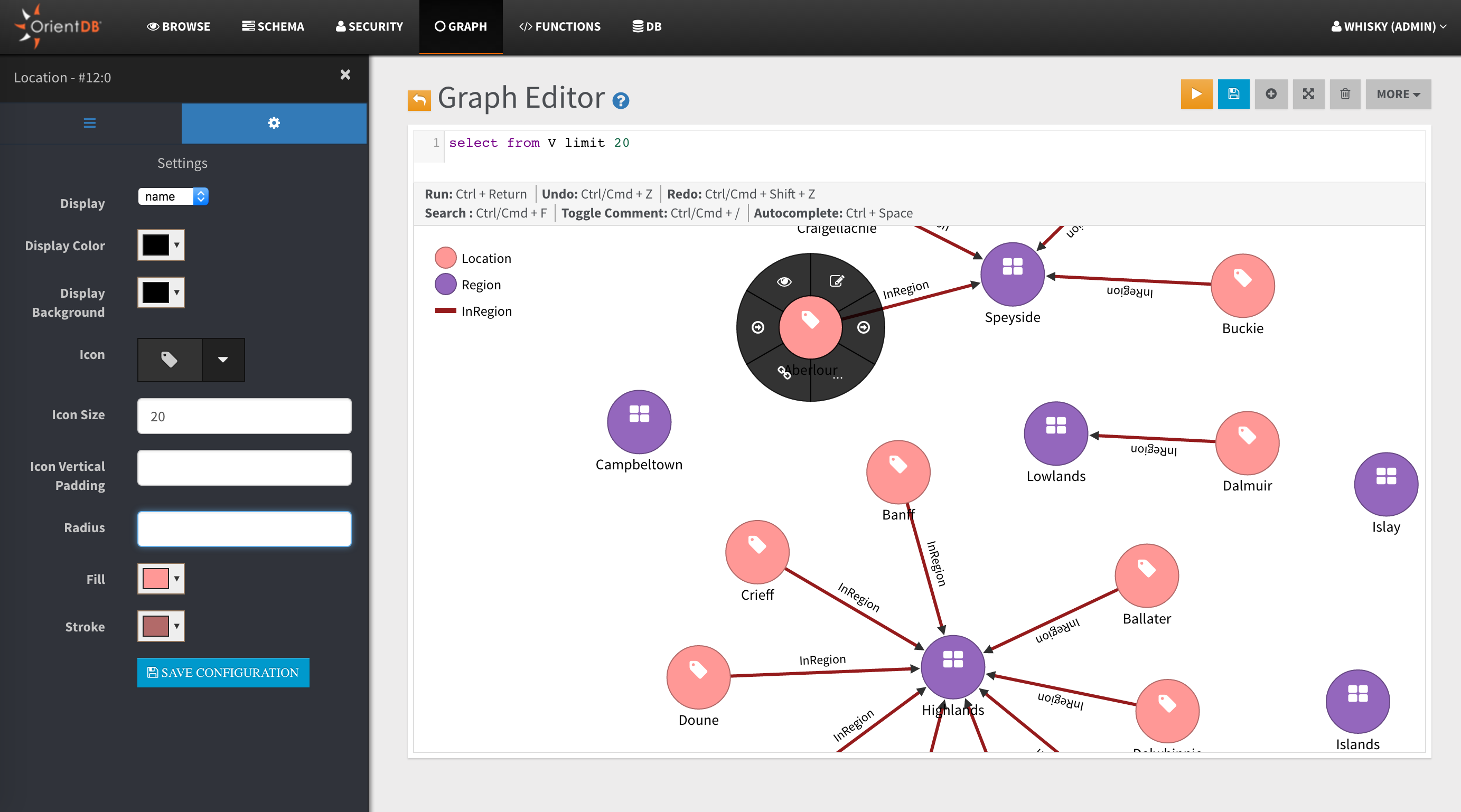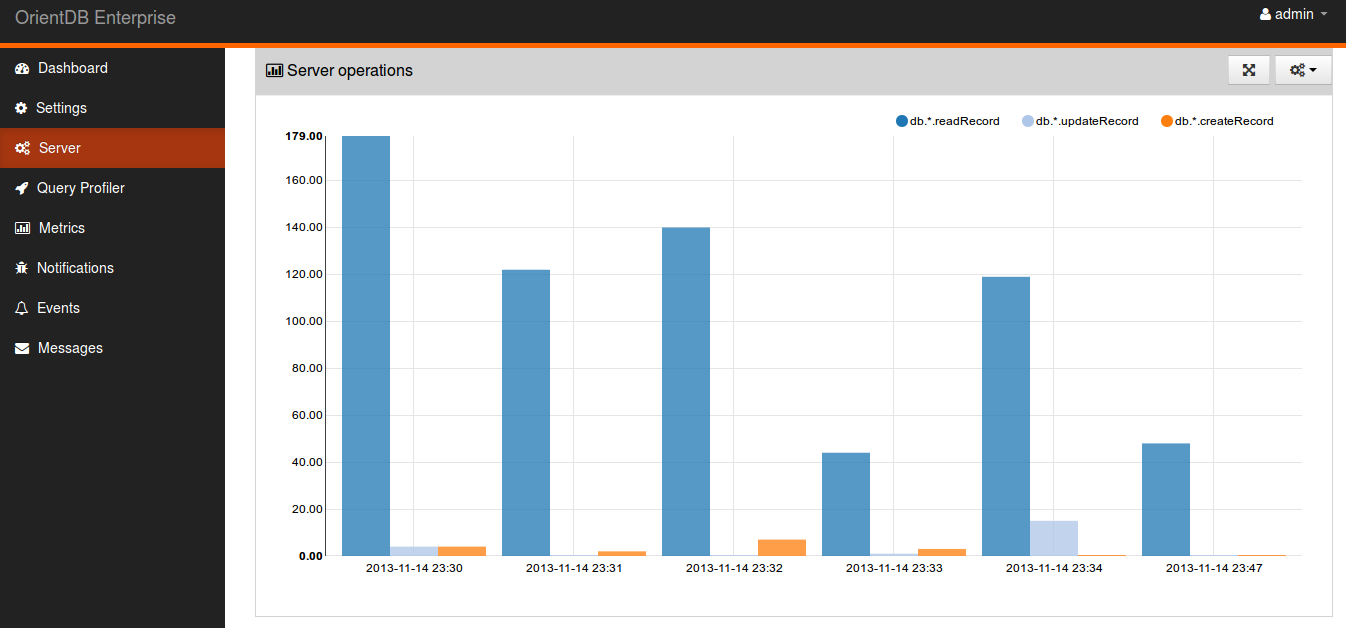Top Rated OrientDB Alternatives
60 OrientDB Reviews
Overall Review Sentiment for OrientDB
Log in to view review sentiment.

Simplicty for graph & document DBs, uniq ACID support in NoSQL world. And being an opensource project with those properties makes this product unique. And being able to replicate to remote DC is a perfect feature. Review collected by and hosted on G2.com.
Random crashes when running SQL from its web client is a big problem which makes me sad after great expectations from this project. Review collected by and hosted on G2.com.

OrientDB is very easy to start with. It's also very flexible as you can use it as a simple document store (like MongoDB). As a document store with link (a unique feature of OrientDB) and as a graph store. Graphs can be queried in a SQL-like language so it's quite familiar to most of us. Review collected by and hosted on G2.com.
OrientDB sometimes looks like a Beta product, crashes are quite common (specially using the UI). Their documentation is incomplete or not very clear sometimes, others is simply outdated. Sometimes you feel like they have tried to do too much before fixing some bugs that look like they occur very common.
Also, their Gremlin version is outdated with the current Gremlin documentation so, sometimes is quite difficult to figure out how to do something. Review collected by and hosted on G2.com.

The best thing for me is that I can use it as an embedded database inside my server avoiding network overhead.
Also low level functionality is available for me with Java API and I can avoid using SQL and other languages. Review collected by and hosted on G2.com.
Massive usage of mutable state and ThreadLocal variables in the OrientDb source codes could introduce tricky bugs.
Documentation is not comprehensive and far away from this. So I have to read source codes to find out a solution. Review collected by and hosted on G2.com.

Scripting with JavaScript is incredibly useful, especially if some of your team members are more proficient with front-end technologies. Review collected by and hosted on G2.com.
Documentation touches most topics, but it does not go into enough detail in almost all cases and there are way too few examples. The OrientDB team really needs to put more resources into documentation and code examples.
Also, there is a lot of work to be done on the web interface. Its heading in the right direction, but definitely still in its early stages. Review collected by and hosted on G2.com.
SQL. OrientDB supports multiple commands (such as insert, query, update, delete, traverse, and more) all through the use of SQL. It should also be noticed the Orient team is very active on github, including support for bugs, new features, and help on any matter for it's users.
Also, although not used thoroughly (yet), OrientDB is scalable. For write & read. Which is a very important thing, specially in today's world. Review collected by and hosted on G2.com.
It's web interface. Orient web interface feels immature, and a bit too complicated for the task it should do.. Also, some of it's simple commands seems a bit awkward. A simple example would be connecting to a database, after connecting to the server, which will still require you to enter credentials, and the connection information (host, port, etc, assuming they are needed for the server as well). Review collected by and hosted on G2.com.
OrientDB is the only NoSQL database I have come across, that has the potential to be an everyday's database usable for any type of project, giving you the full range of features (including SQL as query language) you have been used before using your relational database systems plus all the advantages of NoSQL databases in one single database system. No need anymore to select the most appropriate relational or NoSQL database, OrientDB does it all and does it all very well. Review collected by and hosted on G2.com.
A lot has been added to the SQL dialect lately. A lot of the late additions make me feel like that it was more important to have some language construct to be able to access a new feature fast rather than thinking a little bit more about how to add new language constructs the best way so that the dialect maintains to be a consistent SQL dialect rather than slowly growing into a language of its own, rather confusing at times and rather distinct from SQL. Review collected by and hosted on G2.com.

The recommendation engine my colleagues and I coded using OrientDB is actually working in this very moment. In the end, it turned out to be a solution for us. The studio it provides is also quite useful and pretty, especially the graph part of it. And it's a relatively cheap solution after all. Review collected by and hosted on G2.com.
Bad documentation. New versions breaking code written with old version. The SQL-like syntax is only useful for basic queries, which a complicated project will not limit to. Using gremlin is painfully difficult. Review collected by and hosted on G2.com.
Fusion of object-oriented and document/graph features in the one single database. I also like very fast access to the linked entities which OrientDB provides by using the notion of 'pointers'. You literally have O(1) complexity in terms of accessing nested and linked entities.
This database also has a multi-master replication feature which means that you will have less sleepless nights if, for example, one of your database servers goes down. The other ones will correctly handle this problem.
This database has any possible feature that you'd ever need. It's blazing fast, supports multi-master replication (as I already mentioned) and has Apache 2 licence which means that you can use this database for your commercial products.
If you run into a bug, don't hesitate to create an issue at Github. Most of the bugs are solved in 1 to 3 days which is quite impressive for so massive product. Review collected by and hosted on G2.com.
In general, OrientDB suffers from childish problems. For example, embedded maps were broken since OrientDB 2.0.1 and nobody noticed that (until I created a bug report). Import/export feature was also broken for a long time and it seems that I was the only one who was using this feature back then.
Most of the problems were quite simple and had been fixed very fast (thanks to the OrientDB team). Review collected by and hosted on G2.com.

easy installation on raspberry pi and operates smoothly on it.
The system persisted about 2 million registers of data without problems.
Orientdb never stopped. (one year).
The web application for database administration is pretty good.
The web application for database administration is pretty good.
The flexibility about choosing operational mode (Document database, graph database, ...) Review collected by and hosted on G2.com.
The Orientdb documentation seems good, but I have problems in searching about specific practical situations (ex: website "stackoverflow") Review collected by and hosted on G2.com.

How fast we were productive with Orient DB - right from the start Review collected by and hosted on G2.com.
The lack of understanding by some of our own system integrators into why we would choose a graph DB versus an Oracle SQL based table solution. I think if Graph DB's were more ubiquitous it would be an easier selling point to the higher level decision makers on software architecture Review collected by and hosted on G2.com.










